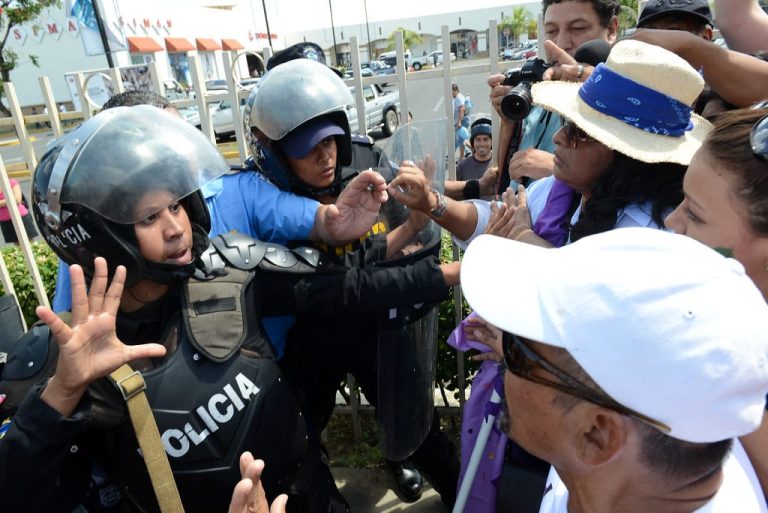26 de noviembre 2022

The Cuban Regime’s Punishment for Filming a Protest

PUBLICIDAD 1M
PUBLICIDAD 4D
PUBLICIDAD 5D
More than 550 attacks against feminist defenders and the closure of almost 200 women’s associations and foundations

In Nicaragua, women, feminists, and human rights defenders cannot carry out marches to commemorate the International Day for the Elimination of Violence against Women because the Ortega regime has prohibited public gatherings not called by his party since September 2018. Photo: Archive
In 2022, the Ortega regime intensified state violence against feminist human rights defenders by massively revoking the legal status of associations that provided support to women victims of violence. In addition, they stepped up persecution, forced exile and imprisoning women activists and community leaders from different parts of the country.
Just in the week before the bogus November 6th municipal elections, where the ruling party led by Ortega took all the City Halls in the country, the Mesoamerican Initiative of Women Human Rights Defenders (IM-Defensoras) documented eight arrests of women activists and territorial leaders.
“Of the eight women detained, two were released. Additionally, we documented 12 events of harassment of four human rights defenders and territorial activists. The Police have been identified as the main body responsible for the attacks, followed by unidentified civilians, people who work for the State and sympathizers of the FSLN,” denounces the Initiative.
During the last six months, IM-Defensoras documented 558 attacks against feminist defenders, including harassment, threats, and forced exile. The latest complaint of this type registered the case of the lawyer and defender of the rights of indigenous peoples, Anexa Alfred Cunningham, who was not allowed to return to the country.
The leader of Miskito origin, who has minor children under her care, was returning from participating in a session of the UN Group of Experts on the Rights of Indigenous Peoples in Geneva (Switzerland), when she was prevented from boarding the flight back.
IM-Defensoras warned in October that the regime is using both forced exile or passport denials as a mechanism against women defenders. Of a total of 140 Nicaraguans who suffered this type of violence, between 2021 and 2022, 60 were defenders, activists, or their relatives.
In addition to exile and persecution, feminist defenders have seen the closure of foundations that provided tools and different types of help to women victims of violence.
A calculation by CONFIDENCIAL estimates that among the 2,981 Non-Profit Organizations that lost their legal status and operation registration, there are at least 122 that worked on women’s rights issues. Five of these date back to 1990, including: the Matagalpa Women’s Collective and the Xochiquetzal Foundation.
This week, the Ministry of the Interior – controlled by the Ortega regime – eliminated another group of NGOs that included six women’s associations, including the Association of Professional Women for Integral Development, the Fatima-San Marcos Association of Disabled Women’s Organization, and the Kukra River Women’s Association.
IM-Defensoras made its own classification by type of NGO and estimates that the number of women’s rights organizations closed was 176 as of September.
“Among the organizations canceled are some with a long and important history of work in the defense of women’s rights, such as the Itza Women’s Collective, a member of the Women’s Network against violence and of the Red de Albergues de Nicaragua, with 33 years of work in defense of sexual and reproductive rights and providing support to survivors of sexist violence,” they denounced.
They also noted that this group had a shelter for women who need protection from the risk of femicide in Somoto, Madriz. The facility had been operating since 2009 and was operating at the time of the arbitrary cancellation of its legal status.
Consummated and frustrated femicides in Nicaragua continue to increase. According to monthly reports from Catholics for the Right to Decide, as of November 2, some 53 women, girls, and adolescents were murdered this year. Meanwhile, another 110 women survived attacks up to August 2022.
Frustrated femicides have increased by 44% since 2018. According to the data collected by this observatory, in that year at least 76 survivors were identified, in 2020 115 were reported, the following year 140 and in 2022 there have been at least 110 by August.
In reality, the figures would be even higher because the observatory only has information on cases that have the greatest impact in the news or are known through networks and women’s groups that provide support to survivors of gender violence.
This article was originally published in Spanish in Confidencial and translated by Havana Times
PUBLICIDAD 3M
Confidencial es un diario digital nicaragüense, de formato multimedia, fundado por Carlos F. Chamorro en junio de 1996. Inició como un semanario impreso y hoy es un medio de referencia regional con información, análisis, entrevistas, perfiles, reportajes e investigaciones sobre Nicaragua, informando desde el exilio por la persecución política de la dictadura de Daniel Ortega y Rosario Murillo.
PUBLICIDAD 3D